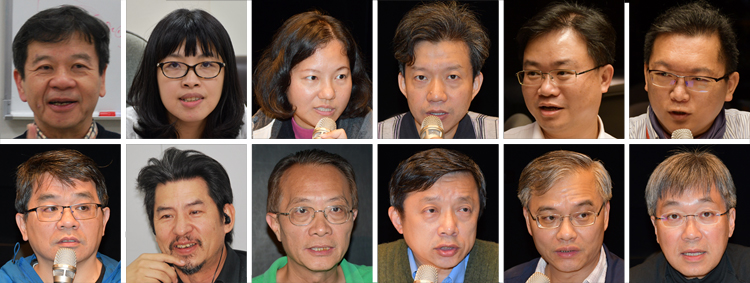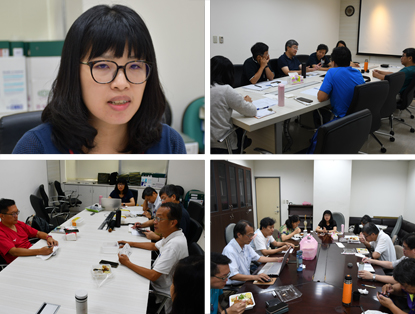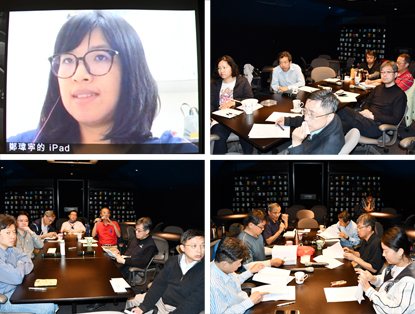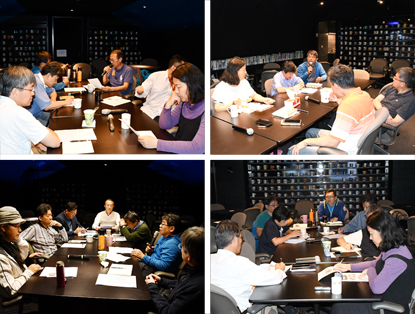Archilife Living Special Team Conferences
|
祐生生活特組會議 全球氣候異變已經呈現暴烈化的趨勢,本會依據台灣的氣候條件與地理位置研判,因氣候異變而引發的衛生與健康問題,最可能對台灣造成嚴重威脅。為強化祐生生活研究中心因應未來可能發生的衛生與健康等問題的能力,生活特組自106年3月份起,每週召開一次特組會議,就相關議題進行研討。生活特組由蘇慶華教授指導;組長為鄭瑋寧小姐;組員包括:湯淑貞小姐、鍾政勳先生、蔡坤憲先生、羅陽青先生、高傳棋先生、戴永禔先生、林得恩先生、王文安先生、劉定衢先生、陳泰安先生等。茲將各階段研討成果說明如下:  The global trend of violent climate change is upon us. The Archilife Research Foundation has deemed, based on Taiwan’s climatic conditions and geographical location, that hygiene and health issues arising from climate change will most likely pose a serious threat to Taiwan. In order to strengthen Archilife Living Research Center’s ability to cope with possible hygiene and health problems in the future, the Archilife Living Special Team has since March 2017 convened the Archilife Living Special Team Conference once a week to discuss relevant issues. The Archilife Living Special Team is under the supervision of Professor Su Ching-hua; the team leader is Ms. Cheng Wei-ning; the members include: Ms. Tang Shu-chen, Mr. Chung Cheng-hsin, Mr. Tsai Kun-hsien, Mr. Lo Yang-ching, Mr. Gao Chuan-chi, Mr. Day Yeong-tyi, Mr. Lin De-en, Mr. Wang Wen-an, Mr. Liu Ding-chyu, and Mr. Chen Tai-an. The research results in respective stages are explained below:  自108年3月8日起至6月28日止,召開108年上半年特組會議,研擬完成衛生與健康促進方案。研討成果包括:分析全球氣候異變趨勢並探討其對台灣與福隆地區衛生與健康等相關問題的影響程度;檢視祐生生活研究中心公共衛生條件,包括衛生教育訓練、傳染疾病管制、醫療支援體系等;研擬提出祐生生活研究中心因應衛生與健康等問題,應採取的改善措施或增設系統,包括:加強生態環境管理、開發共生藥用植物等食療系統等。 自108年3月8日起至6月28日止,召開108年上半年特組會議,研擬完成衛生與健康促進方案。研討成果包括:分析全球氣候異變趨勢並探討其對台灣與福隆地區衛生與健康等相關問題的影響程度;檢視祐生生活研究中心公共衛生條件,包括衛生教育訓練、傳染疾病管制、醫療支援體系等;研擬提出祐生生活研究中心因應衛生與健康等問題,應採取的改善措施或增設系統,包括:加強生態環境管理、開發共生藥用植物等食療系統等。From March 8th, 2019 to June 28th, 2019, the Archilife Living Special Team Conference for the first half of 2019 was held where a hygiene and health promotion plan was formulated. The research results include: analyze the global climate change trends and discuss the degree of impact of Taiwan and Fulong area’s hygiene and health related problems, examine Archilife Living Research Center’s public health conditions, including health education training, infectious disease control, medical support system, etc.; formulate and propose Archilife Living Research Center’s response to hygiene and health problems, improvement measures and additional systems to be adopted, including strengthening ecological environment management, developing symbiotic medicinal plants and other food therapy systems.  自108年7月5日起至12月27日止,召開108年下半年特組會議,研擬未來疫病趨勢分析與垂直遷徙方案。研討成果包括:分析氣候異變對傳統疫病與新興疫病的影響並提出因應策略;研擬因氣候異變影響,導致平地不可居須垂直遷徙避難時,避難基地選址原則、評估項目及避難期間應攜帶的求生設備;探討氣候異變對糧食生產的影響並提出因應策略;規劃野外求生夏令營課程,加強人員求生技能。 自108年7月5日起至12月27日止,召開108年下半年特組會議,研擬未來疫病趨勢分析與垂直遷徙方案。研討成果包括:分析氣候異變對傳統疫病與新興疫病的影響並提出因應策略;研擬因氣候異變影響,導致平地不可居須垂直遷徙避難時,避難基地選址原則、評估項目及避難期間應攜帶的求生設備;探討氣候異變對糧食生產的影響並提出因應策略;規劃野外求生夏令營課程,加強人員求生技能。From July 5th 2019 to December 27th, 2019, a special team meeting for the second half of 2019 was held to formulate and complete future epidemic trend analysis and vertical migration plans. The research results include: analyze the impact of climate change on traditional epidemic and emerging epidemic and propose coping strategies; formulate shelter base site selection principles in the event vertical migration shelter is needed as land becomes uninhabitable due to climate change; evaluate items and survival equipment to carry during evacuation; explore the impact of climate change on food production and propose coping strategies, building plant genetic resources databases, planning wild survival summer camps to strengthen evacuation staff’s survival skills.  本會期望生活特組針對各項議題研擬完成因應方案後,能持續落實為具體行動,除強化祐生生活研究中心做為避難基地或第二辦公室的條件,並為未來垂直遷徙預作準備。 本會期望生活特組針對各項議題研擬完成因應方案後,能持續落實為具體行動,除強化祐生生活研究中心做為避難基地或第二辦公室的條件,並為未來垂直遷徙預作準備。We expects the Archilife Living Special Team to formulate and complete response plans targeting various issues and continue fulfilling them by taking specific actions. In addition to condition Archilife Living Research Center as a shelter base or second office, future vertical migration preparation will be undertaken. |

